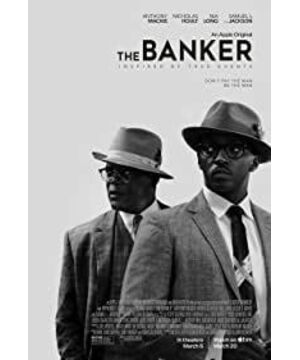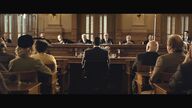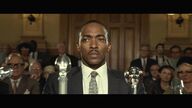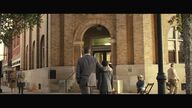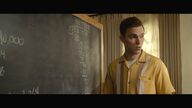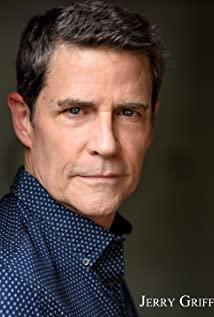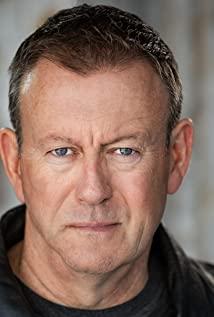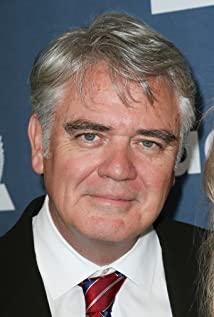"The Banker" is a biographical film adapted from the true story of Bernard Garrett, a black entrepreneur. The director of the film George Nolfi (George Nolfi) is also one of the screenwriters of the film. Looking at George's work history, I found that he may be better at screenwriting than the director's work (he is one of the screenwriters of films such as "The Bourne Shadow 3" and "Twelve Arhats"). Judging from the effect of the film, it seems that the screenwriting skills are greater than the director skills. Next, I try to analyze the movie from the perspective of the script.
The whole film has a total of 120 minutes-5 minutes for the prologue, 20 minutes for the first act, 30 minutes for the second act, 45 minutes for the third act, and 20 minutes for the fourth act-forming a complete four-act play structure.
The prologue is very exciting: a 1-minute hearing scene is used to establish the first keynote of the film (historical sense, realism), and raise the first question throughout the film (what kind of person is qualified to run a bank that is related to the cornerstone of society) ?); Use 4 minutes of childhood drama to explain the actor’s personality (smart, pragmatic, motivated, ambitious) and growth environment (low-level black families in Texas in the 1920s and 1930s), laying the second tone of the film (light, light, Active and energetic), while raising the second question throughout the film (Can a black man from the bottom earn money in the same way as a white man?).
Such an informative opening is enough to arouse the audience's interest. A good movie usually only takes 5 minutes to capture the hearts of the audience. Otherwise, why do video sites always start charging at the 6th minute of the movie!
The first act of the film is about primitive accumulation. At the end of the prologue, the actor's father made a point: Maybe you just can't succeed with us (Texas). So we came directly to Los Angeles for this scene. The screenwriter completes this part of the narrative through several small transitions such as "seeing opportunity → encountering obstacles → removing obstacles → initial success", and presents a clear arc of characters: he has become a poor boy who lives in his wife's uncle's house. Owners of multiple real estates have greatly improved the lives of their family members and initially raised their social status.
In the seemingly satisfactory narrative in the first act, the screenwriter has not forgotten to pave the way for the following story. First, get to know Matt Steiner through his cousin; second, get to know Joe Morris through his wife. In real events, Bernard may not have met Matt and Joe through these two channels, but what does it matter? Simplifying the details can ensure the narrative rhythm of the film. Foreshadowing three, Bernard and Joe went from a misunderstanding when they met for the first time to a reconciliation when they met again; for the fourth, Matt went from merely helping to willing to work for Bernard. These two foreshadowing not only laid the foundation for the second act, but also contributed a lot of comedy elements to the film, and found a stronghold to ease the rhythm in the rapidly advancing plot.
Then enter the second act to complete the formation of the team. At the end of the first act we saw Bernard and the Irish forming a very effective cooperation, they seemed invincible, so at the beginning of the second act we saw the sudden death of the Irish, Bernard is about to lose himself All the hard work. Clever? Here, the screenwriter squeezed the audience's psychology to death: a takeoff followed by a fall. How should our hero cope with this sudden crisis? Don't worry, the first act is already scheduled-we have Joe and Matt.
Joe's entry was completed through a discussion. The topic of discussion is exactly the question raised in the film's prologue-can blacks make money in the same way as whites? The solution to this problem is Matt. The screenwriter wrote quite a lot on Matt's entry, and designed it as an interesting form of game breakthrough (golf, aristocratic etiquette, economics knowledge). The screenwriter here also set up a secondary line, namely "Matt's Life". A white man has completed the class leap (at least looks like a rich man) and reaps love (at least it looks like love) through such an opportunity.
In the creation of this scene, the screenwriter did not set several turning points as in the first scene. The small team succeeded in the first attempt, so it successfully completed the protagonist’s arc in the second scene: from the body. From desperate helpless people to true entrepreneurs with teams.
The third act must be the most important part of the film. Our protagonist has achieved great success in California, so let him go back to his hometown to see-see if, as Bernard's father said, he can't succeed in Texas? At the beginning of the third act, through the display of the status quo in Texas, it echoed the scenes in the prologue (including the shoe-shining black boy), and what my father said to Bernard also echoed the previous article: You have found a place that suits you, but here we are It still doesn't work, maybe it's worse than before. So we saw the second discussion between Bernard and Joe. The screenwriter told the audience through Joe's lines that the next story of the film may not only be about making money, it is moving towards "a social movement." This change in theme almost happened at the midpoint of the film-the 60th minute. A good screenwriter should have this ability to control things and let things happen at the time they should happen!
When our protagonist team went through another test, a real "villain" began to appear. The villain appeared for the first time, at the scene where the protagonist team "victory" again. Contrary to the first two acts "open low and go high", the third act is "open high and go low". With the addition of the villain, the third act once again enters the rhythm of "turning, turning, turning again". Although the ultimate crisis of the film was provoked by the villain, the direct cause of the final defeat came from the side story "Matt's Life": the quick "rich" cannot become a real banker. Of course the secondary story will not be idle writing!
In the third act, we see a reverse arc: the protagonist changes from a banker to a person arrested at the bank's door, and the challenger of the rules is defeated by the rules.
Entering the fourth act of the ending, the screenwriter put more pen and ink in the discussion: how should the protagonist be exonerated, and what are the ways and possibilities for exemption? The fourth act uses various discussions to answer the two questions raised in the prologue, and by this time these two questions have gradually merged into one question: if you have the ability to promote social change, let blacks get equal opportunities as whites, Stepping on the cornerstone of realizing the "American Dream", are you willing to sacrifice part of your own interests to realize it?
The fourth act is a concluding one in the whole story. While explaining the ending of the story, he pushed the protagonist to his "highlight moment"-the "unexpected" remarks made at the hearing. The screenwriter also completed the character review of the two protagonists through the dialogue between Bernard and Joe. They exchanged first impressions (in fact, the audience's first impression of them), and contrasted the changes in the characters in the process. After the protagonist’s highlight moment, a small Hollywood-style "reversal ending" is ushered in, and finally a long-term victory is presented in the form of subtitles-our protagonist has promoted American society in "breaking apartheid" and "eliminating apartheid". Progress on the issue of racial discrimination.
It is not difficult to see that the screenwriters of this film used some structural methods and "routine" techniques when constructing the entire story, so that every turning and important node of the film occurred where they "should" occur. At the same time, the rhythm of the film is adjusted through appropriate comedy techniques and side stories, and the audience's emotional ups and downs are unconsciously controlled. If a screenwriter can make a solid script structure and use tricks or techniques cleverly, then his script must not be too bad!
View more about The Banker reviews


